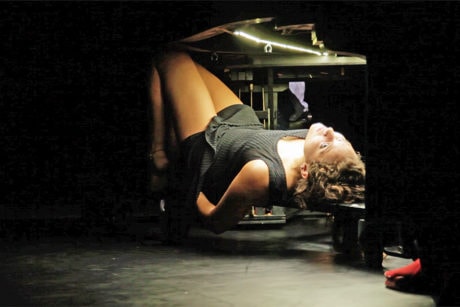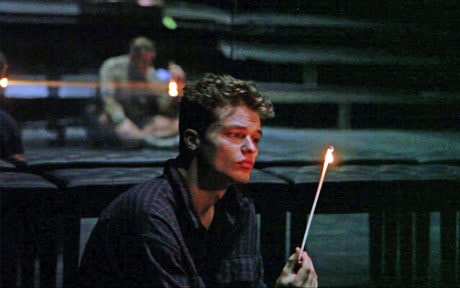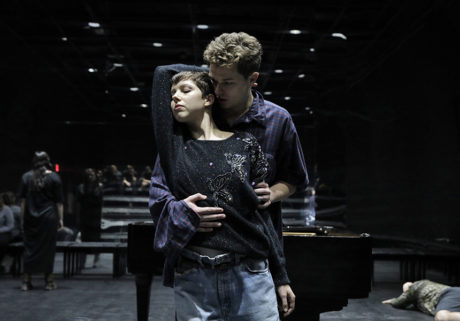Claude Debussy’s only opera, Pelléas et Mélisande, is a unique masterpiece. But it’s very long: five acts, around four hours. So director and playwright Peter Brook in 1992 devised an adaptation called Impressions of Pelléas which runs 95 minutes, and which the Curtis Opera Theater presented last weekend.

What sets Pelléas et Mélisande apart is its wispy, interior view of a troubled family. The British critic Michael White astutely called it “Tristan und Isolde rewritten on tissue paper” and the Brook version is meant to be even more intimate.
Instead of a large orchestra, this version is for one or two pianos. (Brooks’s associate, the composer and conductor Marius Constant, compressed Debussy’s score. His best-known original composition was the theme to TV’s The Twilight Zone.) Curtis used one piano, played superbly by music director Lisa Keller. And Curtis kept things intimate by presenting the opera in a tiny black box studio with a small audience seated against all four walls and with the piano and cast in a square space in the middle of the room. A mirror covered one of the walls.
The stage director R. B. Schlather was exactly right with his interpretation. He wrote for the program, “We are all eavesdropping on each other. There is no divide between character and audience. Move around. Eavesdrop from different places. Enjoy the fluidity that is part of the fear of our contemporary reality. There are no borders. There are no divisions.”
That sounds like what he presented last month in The Wake World at the Barnes Foundation, but it’s not the way this Pelléas played out. If you rose from your bench, you’d fear bumping in to a performer or to the piano which constantly changed position; so no one attempted it over more than an hour and a half.
The Steinway grand piano, with its attached bench, framework and rolling wheels, takes up a lot of space. When it is pushed from one part of the floor to another by cast members, it seems even larger. In an opera house, the orchestra is hidden in the pit and, even though it’s large, the audience forgets its presence. Here, the piano was a distracting barrier at eye level, often blocking out the singing and acting going on behind it. Maybe Schlather’s intent was to replicate the relationship between singer and pianist in a Parisian boîte, or maybe to suggest Debussy’s guests in a drawing-room singing around a piano, which was how the composer himself sometimes performed; but it didn’t really work.

Debussy based his opera on the Belgian Maurice Maeterlinck’s play of the same name, and used Maeterlinck’s French text. The Curtis production was sung in Brook’s English translation. Debussy’s intent was to make all the words understandable and to have the music replicate the pitches of people speaking. Often his melodies sound like an Asian version of Gregorian chant.
Schlather clothed his singers in grungy contemporary outfits, including boots, women in sweatpants and the men revealing their hairy legs. One exception was the choice of outfits for Mélisande — Sage DeAgro-Ruopp in the cast which I saw — who wore modest feminine clothing which reinforced the fact that the character is a mysterious outsider, totally different from everyone else in the mythical kingdom of Allemonde.
Prince Golaud (baritone Dennis Chmelensky) finds Mélisande lost in a forest. He marries her and brings her back to the castle of his grandfather, the blind King Arkel (bass Adam Kiss), where Mélisande becomes attached to Golaud’s boyish half-brother Pelléas (tenor Seongwo Woo), which arouses Golaud’s jealousy.
DeAgro-Ruopp, in her appearance and in the sound of her voice, implies transparency while remaining elusive. She seems to wear the music as if it were an iridescent veil. Her combination of subtlety and burgeoning eroticism is transfixing. What’s more, her words are consistently understandable, but she is alone in that regard. Either because of the room’s reverberation or the singers’ delivery, less than half of their words came through clearly. For a piece where the text is important, that’s unsatisfactory. All except DeAgro-Ruopp allowed their voices to intensify and project strongly, which is wrong for a composition like this.
All of the performers (and presumably the cast that performed on alternate nights) sang with high musicianship and dedication, and I wish I could have enjoyed the result more. Kiss’s voice is sonorous, Chmelensky has a beautiful lyric sound, and Woo was properly ardent and eager. Hannah Klein sang the reduced lines for nurse Genevieve warmly, and Emily Pogorelc was exceptionally strong as Golaud’s son Yniold.
Running Time: One hour and 35 minutes, with no intermission.

Impressions of Pelléas was presented October 5 – 8, 2017 by Curtis Opera Theatre at the Curtis Institute of Music – 1726 Locust Street, Philadelphia, PA. Tickets for future productions at Curtis can be ordered online.




